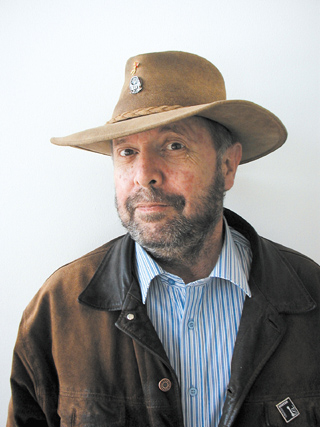Panciotti Elected Senate President

DS Mangus
Undergraduate Student Senate President Joseph Panciotti.
May 21, 2002
Joseph Panciotti, a 59 year-old student in the College of Public and Community Service (CPCS) majoring in community planning and management, has been elected president of the 2002-2003 UMass Boston Student Senate. Panciotti , who faced last-minute opposition from Senate newcomer Stone Laraway, prevailed in the May 15 voting.
A member of the Student Senate for the last three years, Panciotti has served as chair of the Senate’s Budget and Finance Committee, Student Events and Organizations Committee (SEOC) and Campus and Community Affairs Committee.
“As president, first and foremost will be activating the passions of the student body. Other people will point out the apathy of the student body, but I don’t see it that way,” stated Panciotti. “The Campus and Community Affairs Committee being the primary mover of this first priority. This committee will tap into other students, the administration and the Statehouse on issues related to this campus,” he explained.
“We need to become more efficient in everything we do, at all levels. This can be done by listening to each other, students, faculty and staff.” Panciotti declared, adding, “One of the things that got under my skin was that it appears the administration never thought to consult with Mike Stone, the in-house expert on housing, on the housing issue. He’s written a number of books on the subject.”
Panciotti listed “including students” as one of his goals. “When we have events on campus a student (minimally) should be included in the program. I’ve been to several events on campus, when we have people coming in from off campus, and students aren’t included. This university is about students and our students are very talented. What about somebody coming on campus to talk about education and not seeing students at the meeting?”
Commenting on Chancellor Gora, Panciotti stated, “She’s wonderful. However, I’m dubious about where the students really fit into the bigger scheme of things. Each of us is at a different level. She’s the CEO. I believe the students are her first priority, but I’m not sure. I would like to see her more on campus. Like I did the first three months she was here. You could see her everywhere then. She could still stroll around the campus from time to time.”
He went on to say, “All of this applies to the staff and faculty also. We need to see more faculty and staff at cultural events, such as the Asian Cultural Festival or the Unity Awards.”
Panciotti has sometimes been criticized for making the senate process appear complicated through his use of parliamentary procedure. “It’s very cumbersome and difficult if you’ve never experienced it. Once you’ve experienced it, the simplicity of it is actually revealing. The process here at our senate is no different than real life – you have to know the rules.”
One of the primary responsibilities of the Senate is to dispense funds to student groups. “There’s been a big history of abuses in the past,” declared Panciotti. “When your asking for money you have to explain yourself. We don’t make them jump through hoops. There’s been safeguards put in place and we need to use them. The purpose is to open things up, not to have them closed.”
Panciotti described his experience this past year in the Senate as “enlightening.” One of the more controversial issues that the senate faced this term was dealing with the administration’s decision to take funds from the Senate to pay university employees.
“This is not a dead issue. If not outright illegal, it was borderline illegal,” Panciotti said. “I was put aback when I asked the chancellor if the Senate should set aside twenty-five percent of its budget every year to pay state employees. Her one word answer was yes – with no further explanation. And that was after the dean of students said it was a ‘one time thing.’ This tells me that the right hand doesn’t know what the left hand is doing.”
He went on to add, “No where in the constitution and bylaws does it say people who are not part of the Senate can take funds from the Senate. Our voice was taken away from us. They [the administration] say that all funds, regardless of the source, are considered university funds. But the students elect us [the Senate] to spend their fees. No where does it say they have the authority to take that money from us. There was no line item. They just took the money from the Home Fund.”
Panciotti reiterated that this “was not a dead issue. I spoke to two Attorney General candidates at a political function in Malden. There advice was to take it to the UMass Board of Trustees, to their Budget and Finance Committee.” He raised the specter of bringing legal action against the university. “It’s an option that hasn’t been fully explored. Now that I’m in the position, I’ll explore it fully.”
On the issue of recent budget cuts, Panciotti said, “The ‘Save UMass’ effort was more powerful than people would recognize. I’ve spoken to several legislators on my own and have a feel for what’s going on politically. I had a conversation with Speaker Finneran. I asked him when we get our money back. He said he loved my team spirit and we would get the money when they got the money.”
“I’ve asked each member of the new Senate to list five goals they would like to see accomplished in the coming year,” concluded Panciotti. “I look forward to the Senate working to maximum efficiency. We want to make things happen and feel good about what’s happening.”










































































